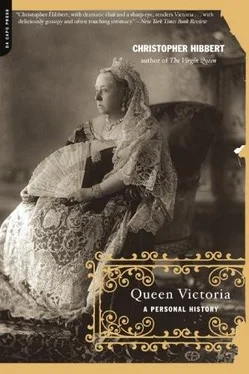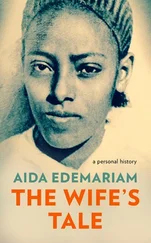Christopher Hibbert - QUEEN VICTORIA A Personal History
Здесь есть возможность читать онлайн «Christopher Hibbert - QUEEN VICTORIA A Personal History» — ознакомительный отрывок электронной книги совершенно бесплатно, а после прочтения отрывка купить полную версию. В некоторых случаях можно слушать аудио, скачать через торрент в формате fb2 и присутствует краткое содержание. Жанр: Биографии и Мемуары, на английском языке. Описание произведения, (предисловие) а так же отзывы посетителей доступны на портале библиотеки ЛибКат.
- Название:QUEEN VICTORIA A Personal History
- Автор:
- Жанр:
- Год:неизвестен
- ISBN:нет данных
- Рейтинг книги:5 / 5. Голосов: 1
-
Избранное:Добавить в избранное
- Отзывы:
-
Ваша оценка:
- 100
- 1
- 2
- 3
- 4
- 5
QUEEN VICTORIA A Personal History: краткое содержание, описание и аннотация
Предлагаем к чтению аннотацию, описание, краткое содержание или предисловие (зависит от того, что написал сам автор книги «QUEEN VICTORIA A Personal History»). Если вы не нашли необходимую информацию о книге — напишите в комментариях, мы постараемся отыскать её.
QUEEN VICTORIA A Personal History — читать онлайн ознакомительный отрывок
Ниже представлен текст книги, разбитый по страницам. Система сохранения места последней прочитанной страницы, позволяет с удобством читать онлайн бесплатно книгу «QUEEN VICTORIA A Personal History», без необходимости каждый раз заново искать на чём Вы остановились. Поставьте закладку, и сможете в любой момент перейти на страницу, на которой закончили чтение.
Интервал:
Закладка:
Prince Leopold had, indeed, other matters on his mind, not to mention sexual desires to gratify. After pursuing a succession of other women, he had fallen in love with a German actress who, looking 'wondrously like' his departed Charlotte, was brought over to England and ensconced alternately in a house in Regent's Park and a 'lonely desolate and mournful' little house in the grounds of Claremont Park where he spent his time either gazing at her longingly while she read aloud to him or picking the silver from military epaulettes to make into a soup tureen. 19
He had also become involved in negotiations for his elevation to a European throne. He had been offered the throne of Greece in 1830 after that country had secured its freedom from Turkish rule and, having declined to become King of Greece, he agreed two years later, after typical hesitation, to be crowned King of the Belgians once Belgium had secured its independence from the King of Holland. The next year he married Princess Louise, the daughter of Louis-Philippe, King of the French.
Before leaving for Brussels he volunteered to give up the grant of £50,000 a year he had received upon his marriage to Princess Charlotte but this gesture, gratefully accepted, was less well regarded when he announced that some £20,000 would have to be retained for various expenses, including the upkeep of Claremont.
Princess Victoria was very sad to have to say goodbye to her uncle. He had done his best to take the place of the father she had never known. Ponderous and, on occasions, exasperating as he could be, she loved him and admired him greatly. 'To hear dear Uncle Leopold speak on any subject,' she said, 'is like reading a highly instructive book.' 20He was the first of those several older men upon whom, throughout her life, she was to rely for help and reassurance. But her mother bore her brother's departure for the Continent far more equably than she would have done at the time of her arrival in England. For the need she had always felt for support, protection and comforting advice had been met by her late husband's beguiling equerry, John Conroy.
Chapter 4
CONROY
'I may call you Jane but you must not call me Victoria.'
Prince Leopold described John Conroy as a 'Mephistopheles'; but the Prince's sister, the Duchess of Kent, did not know what she would do without him. He had been a 'dear devoted friend' of the Duke, she said, and he had not deserted the widow, doing all he could to help her by dealing with her affairs, financial and otherwise. Whereas Leopold was cautious and deliberate, inclined to see difficulties before advantages, Conroy exuded a confidence which the Duchess, comforted by positive men, found reassuring.
Although of Irish descent, with forbears who were proud to trace their lineage back to a royal chieftain of the early fifth century, Conroy had been born in Wales in 1786. He had obtained a commission in the Royal Artillery when he was seventeen and had been transferred to the Horse Artillery two years later. But thereafter he had not progressed as well in the Army as he considered his talents deserved, despite his marriage to a General's daughter, the rather nondescript, indolent niece of the Duke of Kent's friend, Bishop Fisher, by whom he was to have six children. He had not served in either the Peninsular War or the Waterloo campaign; and the Duke of Kent's attempts to find him a suitable staff appointment had not been successful. He had entered the Duke's household as equerry in 1817; and the death of the Duke three years later had given him the opportunity to worm his way into a position far more rewarding and influential than he could have hoped for in the Army.
The same age as the Duchess, he was a good-looking man of insinuating charm, tall, imposing, vain, clever, unscrupulous, plausible and of limitless ambition. Overbearing with those whom he sought to dominate, he was both short-tempered and devious. Charles Greville, the diarist and Clerk of the Privy Council, dismissed him as 'a ridiculous fellow'. 1Conroy immediately recognized that by exerting a compelling influence over the susceptible and self-doubting Duchess of Kent, by isolating her household at Kensington from outside contacts and interference, he might be able to exercise unbounded control over her bright, spirited, affectionate and popular but obstinate and 'naturally passionate' child.
At the same time, Conroy made up his mind to win the confidence of King George IV's sister, Princess Sophia, who had apartments at Kensington Palace. She was nine years older than himself. Cloistered at Windsor in her father's lifetime, in what she and her sisters referred to as 'the nunnery', she had fallen in love with one of her father's equerries, General Garth, and had secretly borne him a child. Conroy had little difficulty in charming the impressionable and mentally rather unstable woman whose considerable finances he controlled, and with the help of whose liberality he was able to acquire a house in Kensington for £4,000 as well as a country house near Reading, Aborfield Hall, and an estate in Wales for £18,ooo. 2Princess Sophia - whose generosity was said to be at least partly owing to Conroy's skill in dealing with the 'bullying importunities' of her illegitimate son, Captain Garth 3- having appointed Conroy her unofficial Comptroller, was induced to apply to her brother, the King, for suitable ranks to be bestowed upon the Duchess of Kent's household. The King, who was fond of his adoring sisters, responded promptly: Louise Lehzen was created a Hanoverian baroness by His Majesty in his right as King of Hanover, while Conroy was created a Knight Commander of the Hanoverian Order.
Sir John Conroy, while so successfully beguiling both the Duchess of Kent and Princess Sophia, failed lamentably in his efforts to win the confidence of Princess Victoria whom he treated with that kind of bullying jocularity which children find so offensive. He told her she reminded him of the Duke of Gloucester, one of the least well-favoured members of her family; he said her economical habits, including the saving of her pocket money, must have been inherited from her parsimonious grandmother, Queen Charlotte; he teased her in the naive belief that she would be amused by his facetiousness rather than offended by what she described as 'personal affronts'. She grew to hate him. The Duke of Wellington believed that this hatred sprang from her having witnessed 'some familiarities' between her mother and Conroy; and when Charles Creevey remarked to the Duke that he 'concluded he was her lover', the Duke replied that he also 'supposed so'. 4In later life Victoria strongly denied that her mother and Conroy could have been lovers, and she was no doubt right to disbelieve that they were; but her detestation of Conroy was nonetheless virulent and the Duchess's fond feelings for her Comptroller soured the feelings between mother and daughter. So too did they sour the friendly feelings which the Princess had earlier felt for Conroy's daughter, Victoire, a rather dull girl, and one of the few children of her own age with whom Victoria was allowed to associate.
Having established his position at Kensington, Sir John Conroy -who did not now trouble to conceal his occasional irritation with the Duchess who, so he said, lived 'in a mist' - set about what became known as 'the Kensington System', a process by which, in Conroy's words, Princess Victoria would become the 'Nation's Hope', the 'People's Queen'. 5This entailed ensuring that the child became completely dependent upon her mother who - should the girl's uncle, the Duke of Clarence, die before she came of age at eighteen - would become Regent. In the meantime, there must be no risk of anyone beyond the Kensington household gaining any influence over the Princess. She must continue to sleep in her mother's room; she must never be left alone in any other room; when going downstairs she must be accompanied by an adult to hold her hand; she must never have the opportunity of talking to a visitor unless a third person were present. She must be strictly shielded from anyone who might endeavour to gain her confidence; furthermore, she must be separated from other members of the Royal Family, in particular from her uncle, the wicked Duke of Cumberland, who, so Conroy liked it to be supposed, as an additional reason for keeping her isolated, was quite capable of having her poisoned or otherwise disposed of so that he could succeed to his brother's throne.
Читать дальшеИнтервал:
Закладка:
Похожие книги на «QUEEN VICTORIA A Personal History»
Представляем Вашему вниманию похожие книги на «QUEEN VICTORIA A Personal History» списком для выбора. Мы отобрали схожую по названию и смыслу литературу в надежде предоставить читателям больше вариантов отыскать новые, интересные, ещё непрочитанные произведения.
Обсуждение, отзывы о книге «QUEEN VICTORIA A Personal History» и просто собственные мнения читателей. Оставьте ваши комментарии, напишите, что Вы думаете о произведении, его смысле или главных героях. Укажите что конкретно понравилось, а что нет, и почему Вы так считаете.











